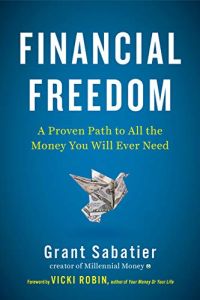Acesse a sua conta getAbstract para obter o resumo!

Acesse a sua conta getAbstract para obter o resumo!
Grant Sabatier
Financial Freedom
A Proven Path to All the Money You Will Ever Need
Avery, 2019
Sobre o que é?
Grant Sabatier was broke at 24. In five years, he made $1 million. Here’s what he learned on the way.
Recommendation
Podcaster Grant Sabatier drew on his experience to write this entertaining introduction to personal finance. In five years, he went from being broke and unemployed to generating $1 million. He assumes you want to be financially independent and that you don’t know much about how to do it, so he helps you figure out how much capital you need to live on your own terms. Sabatier then details viable options, like developing a side business, or investing in stocks or real estate. Throughout, he offers tips on how to act sensibly and minimize your risk.
Summary
About the Author
Grant Sabatier, host of the Financial Freedom podcast, set up MillenialMoney.com, which reaches more than 10 million readers.

















Comment on this summary